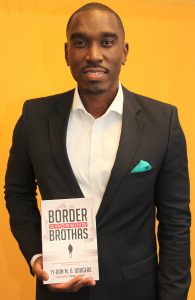Real Educational Reform for Black People Must Also Take Place Outside of Schools
New book says community-based pedagogical spaces can enhance all lives, especially for students of African descent
Educators looking to make a difference in the lives of black males need to focus on “community-based pedagogical spaces” like barber shops, neighborhoods, churches or sports/social clubs as much as they focus on reforming education, says a new book from Ty-Ron Douglas.
Douglas, an assistant professor in the MU College of Education’s Educational Leadership and Policy Analysis Department, has recently released the book “Border Crossing Brothas,” which examines distinct challenges that black males face in Bermuda with a focus on how identities are formed and success is defined. Douglas says that reality for many black males is “contextualized by the intersecting elements of racialized, spacialized, and place-based identities” which calls for as much emphasis on the community as there is on the schools within the community.

“At a time when policy makers are trying to address the overrepresentation of black males in the penal system, and scholar practitioners are trying to close the achievement gap in schools between white students and students of color, this study offers an important reminder of the significance of alternative avenues in the educative experience,” said Douglas.
In the book, Douglas chronicles the lives of 12 young black males from Bermuda, where Douglas is also from, and where 50 percent of black Bermudan males fail to graduate from the public school system. Douglas says that Bermuda is a cultural microcosm of North America, the Caribbean, and Europe.
“People of African descent must cross literal and metaphorical borders in order to participate in our global community and the dominant Anglo-centered paradigms that are privileged in our society,” Douglas writes. “The lack of attention paid to learning spaces outside schools is emblematic of the cultural domination that must be considered if discussions of academic divides and achievement gaps are to evolve into more fruitful approaches.”
Douglas says his research is best explained by a metaphor: “If one or two fish are found floating dead in a lake, the most prudent approach is to ask questions about the health of the individual fish. But when 50% of the fish in the lake are dead in the water, it is prudent to ask questions about the water, the ecosystem, the environment and the conditions in which the fish must survive.”
Dr. Douglas was a keynote speaker for the International Colloquium on Black Males in Education in Bermuda this October. A trailer for the book is available here.